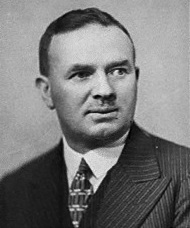James Hargest | |
|---|---|
 Hargest in 1935 | |
| Born | 4 September 1891 Gore, New Zealand |
| Died | 12 August 1944 (aged 52) Normandy, France |
| Allegiance | New Zealand |
| Service | New Zealand Military Forces |
| Rank | Brigadier |
| Service number | 31156[1] |
| Commands | 2nd Battalion, Otago Infantry Regiment 5th Infantry Brigade |
| Battles / wars | |
| Awards | Commander of the Order of the British Empire Distinguished Service Order & Two Bars Military Cross Efficiency Decoration Mentioned in despatches Legion of Honour (France) War Cross (Greece) |
Brigadier James Hargest, CBE, DSO & Two Bars, MC, ED (4 September 1891 – 12 August 1944) was an officer of the New Zealand Military Forces, serving in both the First and Second World Wars. He was a Member of New Zealand's Parliament from 1931 to 1944, representing firstly the Invercargill and then the Awarua electorates.
Born in Gore in 1891, Hargest was a farmer when he volunteered for the New Zealand Expeditionary Force following the outbreak of the First World War in August 1914. Commissioned as an officer, he served in the Gallipoli campaign in 1915 and was seriously wounded. Following his recovery from his wounds, he returned to active duty on the Western Front. He commanded an infantry battalion during the later stages of the war and received several awards for his leadership. After the war, he returned to New Zealand to resume farming. In 1931 Hargest entered the Parliament of New Zealand as the member for Invercargill. Initially an independent, he was one of the strongest supporters of the National Party that was formed in 1936, and held an executive role in the party hierarchy. From 1938, he represented the Awarua electorate and had been considered for the party leadership, but he was no longer available once he volunteered for active service.
Upon the commencement of the Second World War in September 1939, Hargest attempted to join the Second New Zealand Expeditionary Force being raised for service. His application was initially declined for health reasons, but after intervention by Peter Fraser, the acting Prime Minister of New Zealand, he was accepted and appointed commander of the 5th Infantry Brigade, part of the 2nd New Zealand Division. He led his brigade during the Battle of Greece in April 1941 after an initial period performing garrison duty in England. During the Battle of Crete he displayed poor judgement in positioning his forces around the vital Maleme airfield and in controlling their movements once the battle commenced. The loss of the airfield allowed the Germans to gain a foothold on the island and the Allied forces eventually were evacuated from Crete. Despite his own performance during the battle, he received a bar to the Distinguished Service Order (DSO) that he had been awarded in the First World War. The fighting now shifting to North Africa, Hargest led his brigade during Operation Crusader in November 1941 but was captured by German forces. Held in a prisoner of war camp in Italy, he eventually escaped and was able to make his return to England in late 1943. He earned a second bar to his DSO for his efforts. He served as an observer with the British 50th Infantry Division for the Normandy landings in June 1944 and was killed by artillery just over two months later.
- ^ "No. 35396". The London Gazette. 26 December 1941. p. 7332.